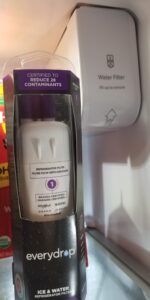Flushing A New Refrigerator Water Filter?

My refrigerator automatically reminded me that it was time to change my water filter. I don’t keep them around the house as they tend to be expensive (> $40) and I don’t know if they have a stale date. So, I ordered one through the usual channels and received it in a couple of days. The installation took hardly a minute to manage. Then, in the usual course, it came time to “flush the filter”. I truly hate this ever-so tedious chore, as it can take quite a while.
The price for clean water, beyond that of the filter, is still a worthy one, of course. However, some representation seems appropriate. With this said, I did some investigating and have come up with the following answers to the question:
Why Does A New Water Filter Need To Be Flushed?
What is in my new filter that is not okay to drink?
Refrigerator water filters typically have a carbon block within them which, through handling in the factories and shipping, may suffer some impacts. This, in turn, can cause some of the carbon to break loose, often in a kind of fine dust. The loose carbon can cause cloudiness to the water immediately dispensed after installation. The carbon cloudy water will not hurt anyone but, it will certainly change the taste of the water. Further, most people don’t like the idea of drinking cloudy water.
In the end, it’s decidedly best to flush out the new filter, just in case. It seems the price of business when it comes to clean drinking water. Note: I recently had a reverse osmosis system of some size put into my house. It too had to be flushed for the same reason.
How Often Should I Replace my Water Filter?
Impurities picked up by the carbon are held on the surface area of the carbon. That surface area is limited but will usually hold the impurities of up to 300 gallons of water (depending on the quality of the water coming into the home or building. Particularly hard water will require more frequent changing of filters). If an old filter is left for too long, a bad taste or smell coming from your drinking water will become obvious. At that time you can be certain your present filter has passed its effective lifespan. As mentioned in the introduction, most new refrigerators will have an alert built into the unit. However, if you find that you don’t have this facility, the general rule of thumb is to change your filter every six months. As stated later on, if you find your water (of ice cubes, if you have a cube maker) is beginning to smell abnormal, changing out your filter will very likely solve the problem.
